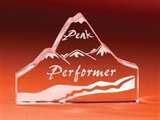 One of the wonderful by-products of high self-esteem is that you become a "Peak Performer."
One of the wonderful by-products of high self-esteem is that you become a "Peak Performer." Every day you become more aware of your abilities and recognize that opportunities to stretch your capabilities are limitless. You desire change, growth, and challenge, and a healthy self-esteem provides the energy.
Every day you become more aware of your abilities and recognize that opportunities to stretch your capabilities are limitless. You desire change, growth, and challenge, and a healthy self-esteem provides the energy.
Peak performers have more than goals, they have a vision of what their life will mean to themselves and others. Peak performers do not live in the future. Peak performers make sure each step taken in the present keeps them on the road toward their life goal.
Competence is a cause of effective performance, not a synonym for it. A competence can be defined as a particular internal sequence of modality events that characteristically produce a predictable behaviour or outcome.
Mostly, the difference that makes the difference is that peak performers persist in going for their high goals despite these moments of doubt. They manage to keep themselves going despite the internal and external objections to their continuation on the path. They manage to stay committed to their goals even when all the outside evidence (and even some of their inner voices) suggests it would be better for them to just quit.
If you want to be a true peak performer, you'd better prepare for the kind of massive doubt and frustration that would cause 999 out of 1000 people to give up - and justifiably resign from the task.
 There are always more reasons not to go ahead. There are always more obstacles to be overcome - the biggest of which are internal barriers to high achievement.
There are always more reasons not to go ahead. There are always more obstacles to be overcome - the biggest of which are internal barriers to high achievement.Often it is just fear that defeats more people than any other single thing in the world.
What about the fear that you have taken the wrong path? What about the fear that you might waste a large part of your life building a castle in the sky? What about the fear that you will come up short? These must all be addressed and treated or they will continue to get in the way of your performance. But as important as they are, they are usually nowhere near as powerful as that nagging sense of doubt in your own ability, your own worthiness, and your own goodness. The nagging thought, "I'm not good enough". Or "I'm not good enough yet". The idea that something more is needed to make us be what we need to be. That once we become perfect then we can proceed. So far, I haven't met one person on the peak performance path without some challenges with self-doubt and the need to be perfect.
But for most truly worthwhile goals we need to proceed before we achieve perfection because waiting for perfection before commencing will mean we stay permanently inactive.
Fire up your motivation for superior results
We all strive to be good at something, because this leads to power... or love... or money... or recognition... or acceptance... or parental success... or career success... or relationship success... or health... or success in competitive games... or avoidance of hardships... or recreational fun... or avoidance of unpleasantness... or your personal legacy. Right?!
For peak performance – even if it is for something as seemingly mundane as exercising every morning – you begin with motivation. And that’s where we begin with the new Peak Performance Paraliminal.

Peak Performers Can Say:
1. I am motivated and have a mission with realistic and measurable goals.
2. I accept complete responsibility for everything I think, say, feel, and do.
3. I look for the window of opportunity in every situation and know that I will learn from every experience if I choose.
4. I always help others to do their best, and I encourage everyone to contribute something.
5. I correct my course when I reach an obstacle. This way, when things go wrong, I am still headed in the right direction.
6. I expect and appreciate change. It does not overwhelm me because I am prepared.
7. I stand up for my own opinions and values and respect others.
8. I am able to manage myself. I do not require instruction every step of the way.
9. I am not afraid of making mistakes or of taking reasonable risks.
10. I am my own coach. I engage in positive self-talk and rehearsal.
11. I am a life-long student. I am always ready to learn, and I know growth takes sustained effort.
12. I know myself well and still expect to find hidden talents, resources, strengths, weaknesses, energy, and interests.
13. I respect reality both pleasant and painful.
14. I engage in self-confrontation and do not blame others.
15. I readily forgive others and myself and correct mistakes when possible.
16. I am patient, kind, gentle, and compassionate with myself.
17. I have no need to prove I am better or worse than anybody else.
Support Systems for Peak Performance
The road to greatness is not a path one takes alone. Navigation requires the assistance of what is called a support system—a small group of very special people, in some cases just one person, who helps you stay the course during times when you have trouble doing it for yourself.
 Sometimes is appears as if a champion is doing it all him or herself. I have yet to hear of a performer for which this was entirely the case. Somewhere along the way there is an aunt, a coach, a church representative, the memory of a lost friend, that fulfills this need. Many times these people go unnoticed—often they seek to avoid attention for their contribution, nor do they want it. That’s part of what makes them a true support system. Their interest and heart is in helping their loved ones push themselves to be the very best they can be.
Sometimes is appears as if a champion is doing it all him or herself. I have yet to hear of a performer for which this was entirely the case. Somewhere along the way there is an aunt, a coach, a church representative, the memory of a lost friend, that fulfills this need. Many times these people go unnoticed—often they seek to avoid attention for their contribution, nor do they want it. That’s part of what makes them a true support system. Their interest and heart is in helping their loved ones push themselves to be the very best they can be.It’s not really difficult to understand the concept behind support systems. The difficulty lies in separating a real support system from a host of people whose primary interest is safety and comfort. With good intentions and genuine care, the latter are
 easily mistaken for supporters. They are quick to lend a shoulder for crying; they welcome your frustration with open arms. False supporters are all ears when you want to complain about competition, obstacles, hardships, or just how unfair a shake it was that you received. But moments of discouragement, failure—and even moments of success—are often the times when you most need another person’s help getting back to a peak performance mindset. Real support systems find a way to help you do just that. False supporters allow you to hold onto sub-optimal thinking for long periods of time. They may think they are being supportive by listening or by letting you lean on them. In reality, they are letting you fall short on your commitment to thinking great.
easily mistaken for supporters. They are quick to lend a shoulder for crying; they welcome your frustration with open arms. False supporters are all ears when you want to complain about competition, obstacles, hardships, or just how unfair a shake it was that you received. But moments of discouragement, failure—and even moments of success—are often the times when you most need another person’s help getting back to a peak performance mindset. Real support systems find a way to help you do just that. False supporters allow you to hold onto sub-optimal thinking for long periods of time. They may think they are being supportive by listening or by letting you lean on them. In reality, they are letting you fall short on your commitment to thinking great.Why this happens is, for the most part, a factor of these folk’s unwillingness to really go for it themselves. The don’t shoot for greatness because they are afraid of getting hurt or of losing some of their creature comforts. They’re into the safe route. And when they see a friend or family member hanging it out on the line, they get nervous. With all good intentions, they want to offer protection and shelter. Frankly, they are much more comfortable when they see a performer struggling and they offer to “make it alright.” That reality is much more akin to their own.
 But peak performance never comes from doing it the safe way. It comes from putting everything you’ve got into your dream, being willing to fall flat on your face and then getting up and doing it again. For that, you need supporters. And you need to be surrounding yourself with the kind that push you to keep great thinking on track.
But peak performance never comes from doing it the safe way. It comes from putting everything you’ve got into your dream, being willing to fall flat on your face and then getting up and doing it again. For that, you need supporters. And you need to be surrounding yourself with the kind that push you to keep great thinking on track. Peak Performers has been at the forefront of helping organisations and their employees achieve accelerated growth through the mastery of Self. This is achieved through the exploration of the depths of human potential using validated personality and behavioural tools as well as through extensive research on the psyche of the human mind and how it relates to the body.
Peak Performers has been at the forefront of helping organisations and their employees achieve accelerated growth through the mastery of Self. This is achieved through the exploration of the depths of human potential using validated personality and behavioural tools as well as through extensive research on the psyche of the human mind and how it relates to the body.
Be a peak performer!
I'm striving to be one...

No comments:
Post a Comment